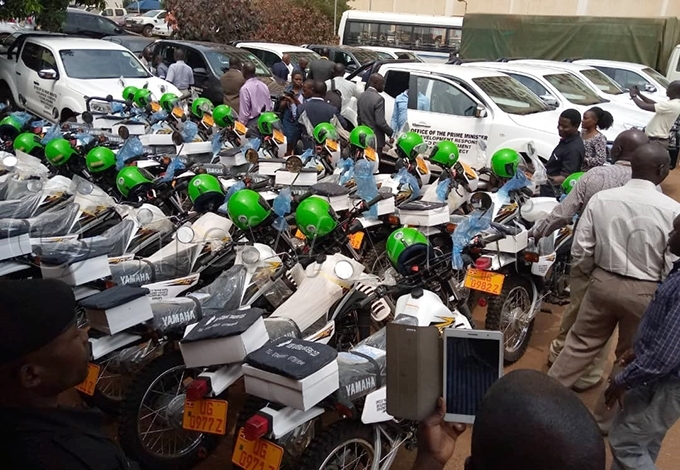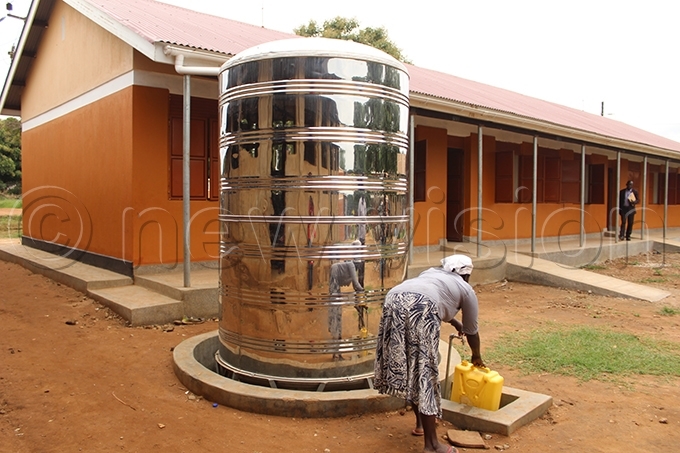Refugee-hosting districts get vehicles, bikes
The $200m project is financed by the World Bank and it focuses on four major components of infrastructure, environment, livelihoods and project coordination
Government has given 10 vehicles and 22 motorcycles to refugee-hosting districts to boost their capacity on the supervision and monitoring of the implementation of Development Response to Displacement Impact Project (DRDIP).
The transport equipment was on Friday handed over to officials from the hosting districts by Hilary Onek the Minister for Relief, Disaster Preparedness and Refugees at a function held in Kampala.
Onek warned Chief Administrative Officers (CAOs) not to allow politicians to misuse the vehicles and to ensure they are used for the intended programs.
"I would like to caution, CAO's who are custodians of these transport equipment; use them for purposes for which they have been allocated. Now that we are going for campaigns you need our support because these politicians will want to batter you," Onek said.
He urged stakeholders from the implementing districts to fight corruption tendencies that might curtail the project.
 Cars and motorcycles that the government gave to refugee-hosting districts. Photo by Geoffrey Mutegeki
Cars and motorcycles that the government gave to refugee-hosting districts. Photo by Geoffrey Mutegeki
"There are reports of corruption by some district officials including members of the community. Whoever is involved is such tendencies must stop otherwise we have put in place mechanisms to catch them," Onek said.
He said the government has committed to ensuring that the funds are spent for the intended purposes.
The $200m project is financed by the World Bank and it focuses on four major components of infrastructure, environment, livelihoods and project coordination.
Implemented in 14 districts, the project is aimed at supporting and developing refugee-hosting communities in districts experiencing a high burden of refugees.
The Director DRDIP, Dr Robert Limlim said the project has changed the face of service delivery in the areas of health and education.
At the moment at least 460 classrooms, 3200 desks, 28 staff houses in the education sector have been constructed since the project was launched on June 29, 2017.
"Over 20,000 children are enjoying better education services in these districts," Limlim said.
A total of sh87bn has so far been disbursed to the districts. 280 kilometres of roads have also been constructed not forgetting health centres.
 A woman draws water from a water tank installed on one of the newly constructed classroom blocks at Biyaye Primary School. Photo by Geoffrey Mutegeki
A woman draws water from a water tank installed on one of the newly constructed classroom blocks at Biyaye Primary School. Photo by Geoffrey Mutegeki
Originally there were 11 refugee-hosting districts; Yumbe, Koboko, Arua, Hoima, Kyegegwa and Isingiro. Others are Kamwenge, Moyo, Lamwo, Adjumani, and Kiryandongo.
But following the split of some district, the number has grown to 14, to include Madi-Okollo, Obongi and Kikube.
Ten districts all received vehicles and two motorcycles each. However, according to Bafaki the DRDIP project manager, districts that have not received, will get their vehicles in a few months.
According to the OPM, Uganda has a refugee population of 1.2 million, making it the biggest refugee-hosting nation in Africa and third in the world.
Refugee hosting areas are among the poorest and less developed sub-regions in Uganda.
The presence of refugees affects the coping abilities of host communities by increasing demand and competition for natural resources, food and basic social-economic services such as health and education.
DRDIP will address infrastructure needs in health, education, and roads. It will also address environmental protection and livelihoods.